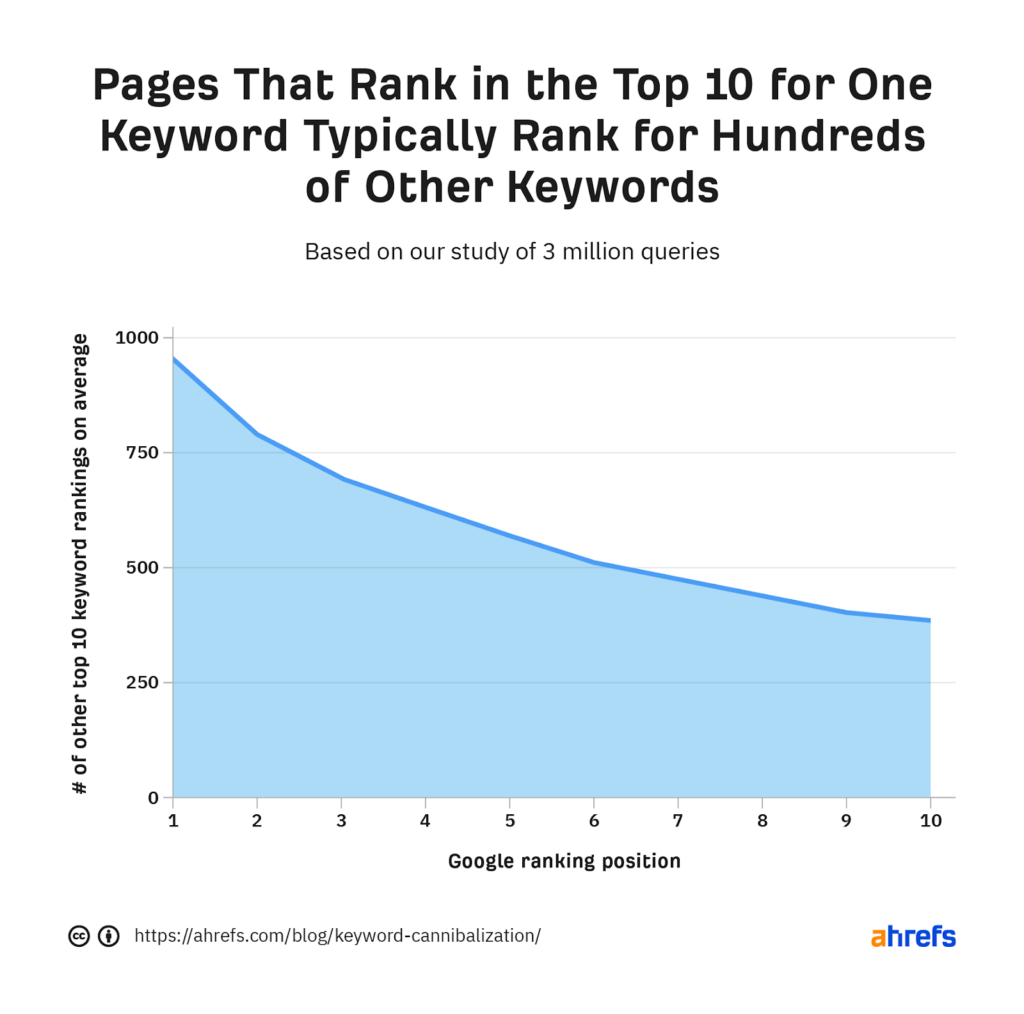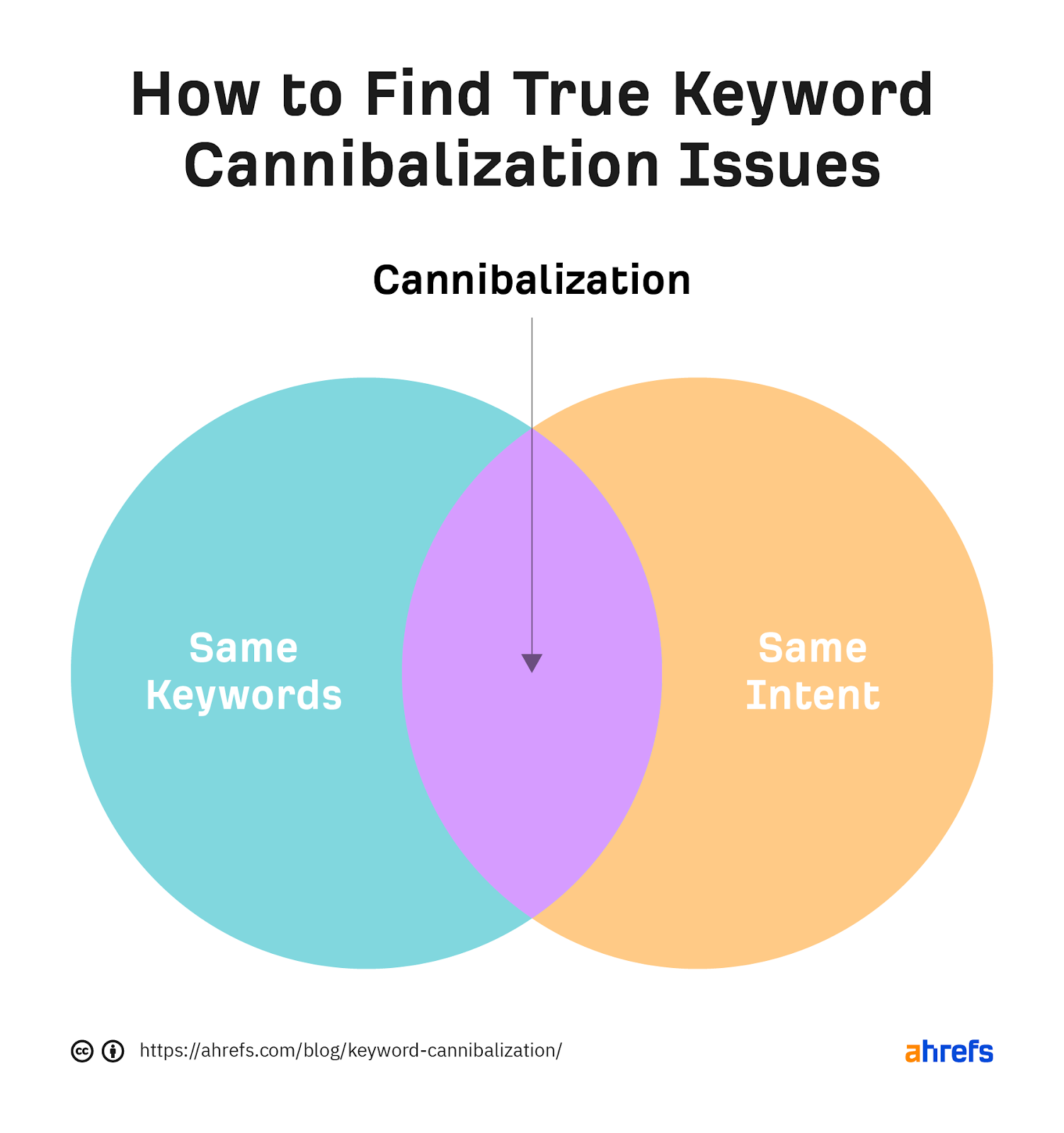In an article or blog post, the most important thing to focus on is its keywords and catchwords. When we have to search for something on Google we have some specific words in our mind that can relate to the actual post the moment we type it, so Google scans that specific keyword to give you some exact pages that contain the relevant information on our screen. Sometimes this is the exact moment when the problem arises. When you search for some specific keywords, Google shows some unrelated material on your screen and the prime reason behind this fault is Keyword cannibalization. This can harm your website as the traffic on the page is now divided.
What Is Keyword Cannibalization?
We already know the importance of keywords in an article so now it’s easy to explain what cannibalization actually means. When your website’s content contains an excessive number of keywords that are the same or similar to one another, and Google ranks different pages on the same keyword in SERPs, so this is known as keyword cannibalization.
This fact sometimes causes Google or any other search engine to rank an article that is less related to the actual search. This act can cause great damage to a website because now
It’s difficult to get traffic on your website that contains more related post
Is Keyword Cannibalization Good For SEO?

Source: ahrefs.com
When we are upgrading our website by paying all focus on some specific catchwords that we already used in a previous post of the same website so this causes great difficulty at the time of ranking the post then this gives an unfavorable signal from the SEO analysis as it gives the less traffic on both of the post overhauling causing harm the actual website.
If to put this in simple terms then let’s consider we have written a blog post on the importance of exercise and on the same website another blog post that is published is about the importance of exercise in maintaining your health. Here both the post seems to be different but in actuality, there are a lot of chances that both articles are comprised of many similar keywords
At times there are no specific keywords but similar words are also the cause behind the cannibalization. When we are optimizing a post for a website so often people use very similar words in explaining the matter that can be creating a barrier to improving the rankings for the website.
How To Know About The Keyword Cannibalization Issues?

Source: Ahrefs.com
The foremost strategy to rectify the cannibalization issues is to make a search on your own website about a similar query and look if any article that you have written in past is still getting higher traffic. If this happens, that means your newly written post resembles that previous post.
There is a number of other ways as well that can be helpful in identifying this issue on your website which is listed below:
DO A CONTENT AUDIT
Content auditing in actuality means an analysis of your website and a remedial action for the underperforming pages. In simple terms, when you are about to write a blog post, first check the previous ones. Try to avoid any comparable catchphrases that have already been used there. Removing low-quality pages, and combining or upgrading the content of individual shallow pages into more helpful pages can help improve the rankings of a website as a whole.
LOOK AT HISTORIC RANKINGS
To avoid the issue of cannibalization, a strong SEO strategy also tells us to keep an eye on the historic rankings. This can help us to spot the keyword repetition in our optimized post and fix the problem. We can also use certain tools in order to keep a proper record and maintain it.
RUN A SITE SEARCH
Search for pages that target the same keywords and provide the same or very similar purposes to identify actual cannibalization problems. This is because any page is unlikely to rank for a large number of different long-tail keyword variations if the purpose is the same. By running a site search you can no about exactly how many blog posts or articles are actually competing with you in a single search and you can keep a record of it
RUN A GOOGLE SEARCH AND REMOVE HOST CLUSTERING
Sometimes we actually detect a problem but are unable to find a solution to it and don’t know the correct way to manage it in the best way. Like when you do a site search so you find out about a similar post the solution to it is to conclude them in the best way but how to do it is the actual problem. Host clustering is a methodology adapted by writers where Google filters off comparable pages from the same host from the search results. this is very useful because it gives each and every URL a sense of place.
CHECK FOR MULTIPLE RANKING URLs

Source: Ahrefs.com
If you are observing that a search engine like Google is ranking multiple URLs that can trigger the issue of keyword cannibalization.
Now the question arises of how to identify and solve the problem. So the best way is:
- Type your domain in.
- Click on the organic keywords report link.
- Multiple URLs can be toggled.
After this, u will find out that this also shows the keyword cannibalization issue
Just keep aware of this thing Google hardly ever ranks multiple pages.
How To Fix Keyword Cannibalization Issue?
We can’t say that by adapting a single method or strategy we can overcome all the problems of our website. There are different ways by which one can fix the matter. First of all, we have to focus on comprehensive keyword research. Using such kind of catchwords can give you inclusive meanings that can also be different from the past ones that can lower the rate of issues.
The second thing we can do is to find someone who can specifically look into this matter he or she can monthly focus the target keywords of the blog post and can avoid using the same term repeatedly because it can be the cause of duplication of link
The third way we can adapt is by researching on our own website. Once you find out that your website is ranking two different posts on the same search, try to merge both of them by using comprehensive techniques and keywords. This can cause the traffic to gather on a single post and improve your SEO rankings.
Another way to fix the issue is to update any one of the posts so that it can differentiate from another one. The question is how you can do that. So we can do this by varying the meta description, title, and slight changes in the content catchwords. This can improve your website traffic. You can also give visual effects to your post that can add additional beauty to your work
The most important and chief way to overcome this issue is to make a plot first in your mind or in black or white. Like on which topic you have to write what the title will be and what are the particular keywords. Also, search on different websites regarding that matter. Once you are done with it then start writing. In this way, you can avoid many of the issues and can give the best results.
Some Solutions That Are Not Highly Recommended
As we know that we can find a number of ways to solve a problem but not all the ways are highly preferred as they can also have some drawbacks. So here are some ways that can be avoided.
DELETE THE PAGE
Deleting the page is the least preferred in the cannibalization issue.
Unless the page has no value for your company (as previously indicated) or solely ranks for the “cannibalizing” term, this is rarely a smart approach. This is an uncommon action to take in the face of cannibalization because both of these circumstances are incredibly unusual.
NO INDEX TO THE PAGE
No indexing means that if you identify the issue in the blog post then remove it from the index of your website. But this issue does not help you in an effective manner.
DEINDEX THE PAGE
It is also a terrible way to fix the issue because you can deoptimize the whole page for just one catchword. Even if you do so this can also apply to the other keywords and can’t get you high rankings.
Final Thoughts
One page should ideally rank for each keyword or user intent. For websites that are expanding swiftly, it is challenging to keep track of this, though. When a website is expanded or relaunched, it is possible to construct extra subpages or landing pages with the same keywords, but Google won’t be able to tell which page is truly relevant.
We are quite sure that now you have all the knowledge you need to quickly and effectively resolve your keyword cannibalization issues in order to ensure more traffic, better rankings, and a better user experience with the keyword cannibalization report, which includes automated insights into the news feed in the search success overview.

